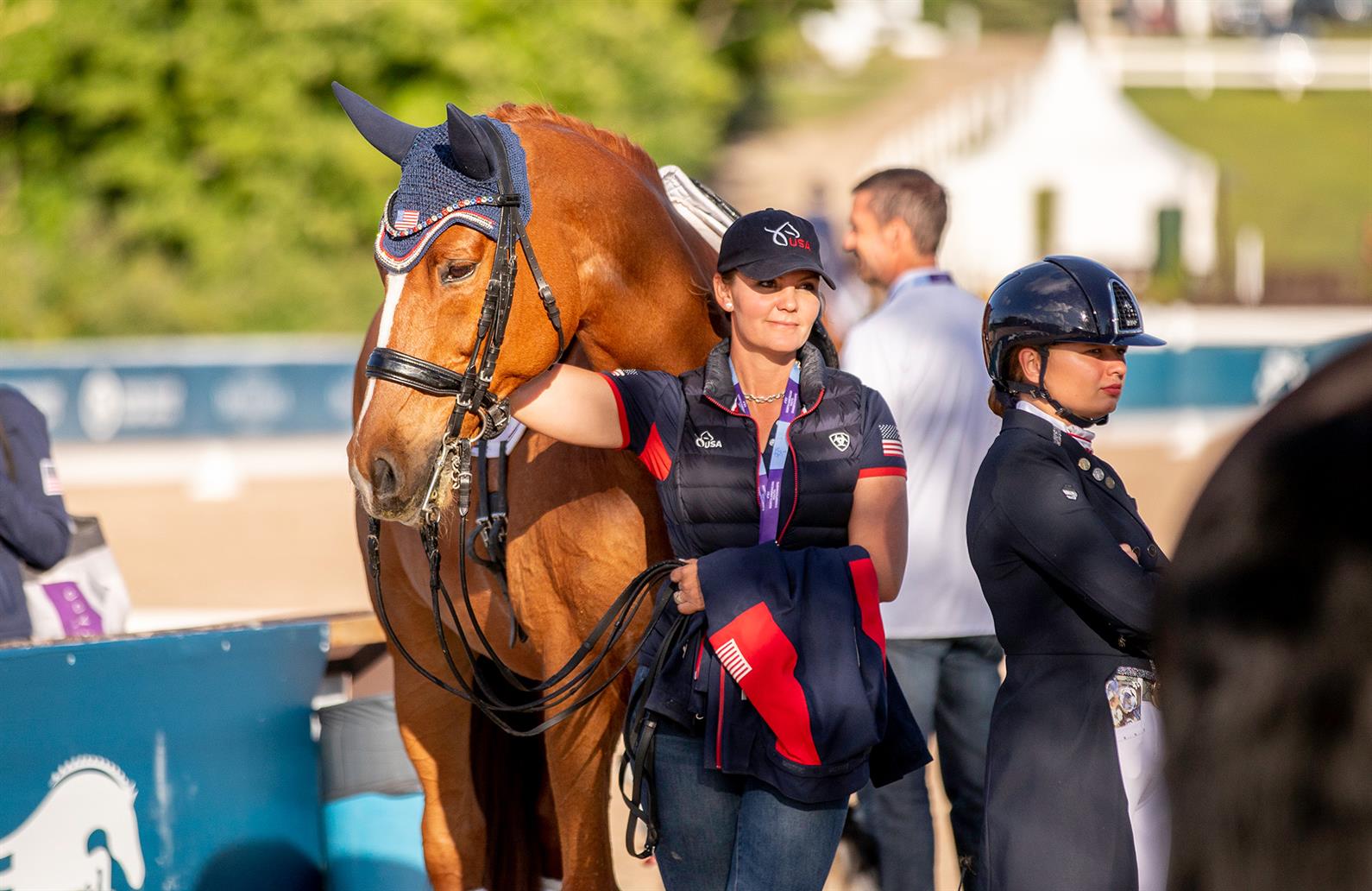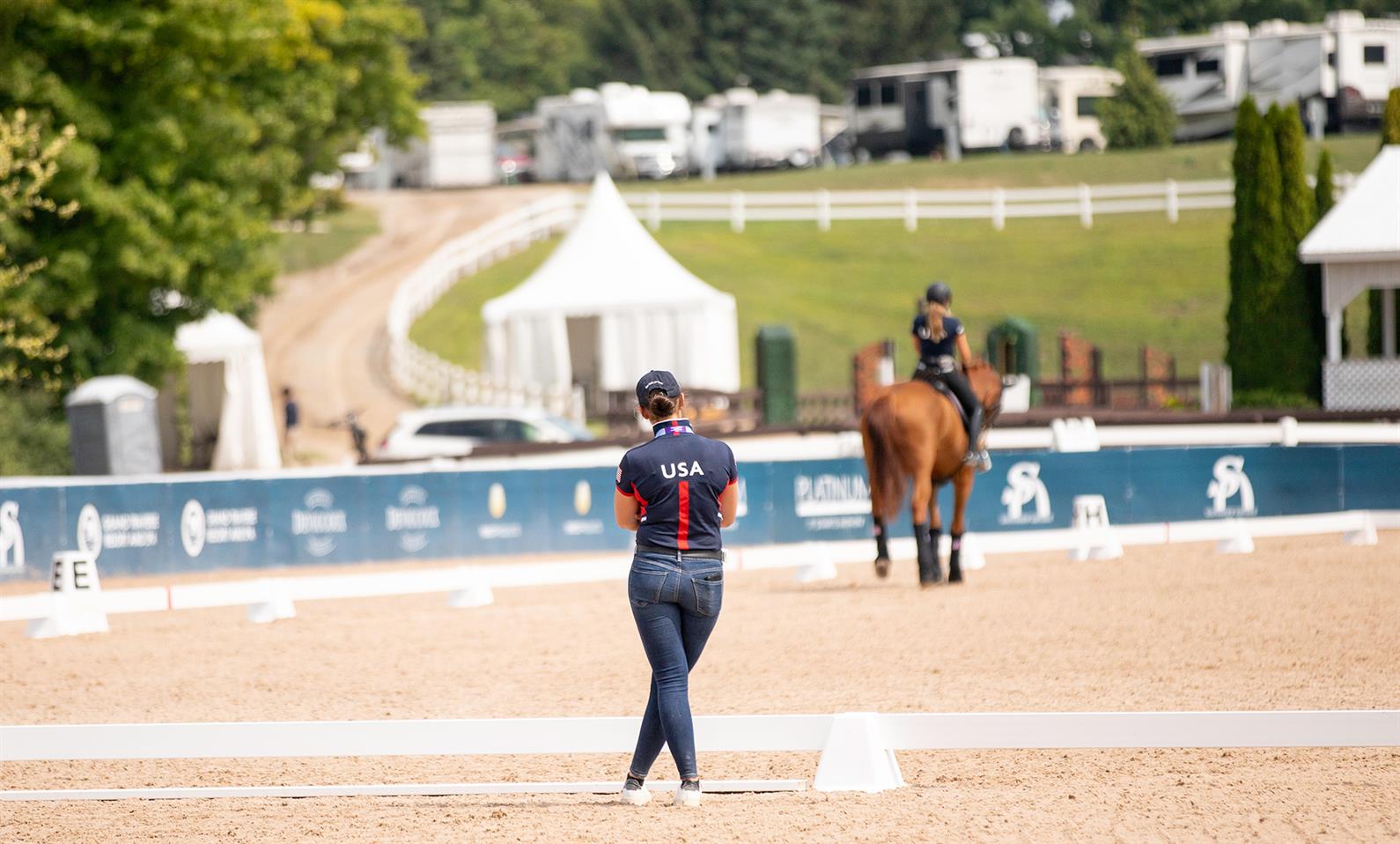Athletes and coaches who have been to the FEI North American Youth Championships (NAYC) often point to the exposure to international team competition as one of the primary benefits of the experience. With limited opportunities for equestrian athletes in the western hemisphere to compete on a team before reaching the senior levels of the sport, NAYC serves as an important steppingstone for young athletes with international aspirations.

Sarah Tubman is a dressage athlete who has represented the U.S. in international competition with First Apple, a 2010 KWPN gelding owned by Summit Farm, most notably at the 2019 Pan American Games in Lima, Peru, where they won individual gold and team silver.
Tubman coached three athletes at the 2023 FEI North American Youth Dressage Championships presented by USDF: Jenaya Olsen with Beach Boy in the U25, Laila Edwards with Farah-Jade in the Junior division, and Marin Roth with Erin Meadows Jagermeister in the Junior division. All three of them were first-time NAYC competitors, so preparing for the specifics of FEI competition was a key component of preparation.
“I made sure that all of them had done a CDI before this, so they at least knew a little bit of the format,” says Tubman. “NAYC is a lot, and they’re young, and it feels like the Olympics to them—it is essentially the junior Olympics, so they’re very excited to be here.”
Tubman says that competing at the international level is easier in some ways than coaching.
“I’m kind of riding every step with them. I feel like I’ve ridden so many tests just watching them,” she says. “Coming into this, the girls and I sat down with Lee [Tubman, Sarah’s husband who is an FEI dressage judge] and had kind of a serious meeting about how these team events work. Our sport is interesting because most of the time, we’re individuals. That’s not to say we don’t cheer for others, but it’s just not part of how this sport is made. So many other sports that young kids are part of are team sports. So that was one thing I made sure to make really clear, is that, yes, you’re here to do your best to beat your own score. But it’s important that you’re at the ringside for every one of your teammates and be there to support them not only in the stables, but in the ring. I think that’s such a good experience that a lot of people don’t get until they’re on a senior team, so they’re at an advantage to have already been in a championship setting and to figure out how this team setting works, because it’s not normal in our sport.”
Tubman speaks from experience on this topic, as her first team experience in dressage was at the 2019 Pan American Games.
“It was a thrown-in-the-deep-end kind of thing,” Tubman remembers. “And you know, it was really inspiring for me, because it was probably the first time that I also had country pride—it’s not only riding on a team, but it’s a team for your country. The U.S. is known for having the sea of red, white, and blue on the backside as you come in and out of the gate, and that’s a really cool feeling. Every stable and every program has their own little support crew, but it’s a really cool feeling when all of your colleagues are standing there cheering you on.”
The connections made in a team setting carry on past the end of competition, Tubman says, and she sees her students forging those important relationships within the sport through their NAYC experience.
“I think that’s important for these athletes at this young age to have that camaraderie,” she says. “And I think it’s important for our sport, and I hope that carries through when they go home and are in training. I have a great group of colleagues that I can call up and say, ‘I’m having a problem with this horse,’ or ‘Hey, what do you know about this bit or this supplement?’ I think it’s so important for our sport to have these athletes start off this way, and then go back home and hopefully keep these relationships going.”

Each team at NAYC has a chef d’equipe in addition to the athletes’ regular trainers and coaches who provide support. Part of the chef’s role is to manage logistics and keep the team members organized, which is invaluable for first-time team competitors.
“You’re very thankful when there’s somebody there helping you organize some of the details of the stuff you don’t know,” says Tubman. “From simply, ‘This is our jog outfit,’ to ‘This is where you need to be at this time.’ I really appreciate seeing these chefs step up. When it’s their first time, I think these kids are really appreciative.”
FEI competition brings new layers of rules and protocols beyond what most equestrians are used to at national shows, and Tubman says it can be a little overwhelming the first few times. In addition to making sure her students had all competed in a CDI prior to NAYC, Tubman and her husband staged a mock show at home, giving the riders the opportunity to have a dress rehearsal with their tests, including their freestyles with their music.
“I think the more you can get in a big atmosphere and in front of five judges, the better,” Tubman says. “Not everybody has access to CDIs, but I think it’s really important they go down centerline for judges that have experienced this level so there are no surprises when you get here.”
Tubman says that on the first day of NAYC competition, many athletes make uncharacteristic mistakes simply because of nerves due to the new environment. Her advice to her students is that sometimes the only thing they can do to get good at certain aspects of competition is time and experience, which is why programs like NAYC are so valuable.
“It was great to be here,” she says. “Kasey Perry-Glass is here, Olivia LaGoy-Weltz is here, and George Williams. It’s really nice to have some of our senior athletes here helping and giving back to the sport at the younger age. So I hope more of us from the senior teams keep bringing along the younger generation, because this is the future of our sport right here.”


